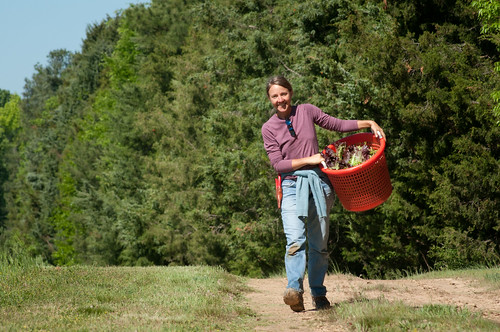Organic gardening is wonderfully therapeutic and anyone can enjoy it. However, for a beginner, the whole gardening experience can be a very intimidating thing to enter into. So, how should a beginning organic gardener learn the basics? All you have to do is read the following suggestions.
After seeds have sprouted, they require less warmth than they did prior to sprouting. Remove plants from the heated environment once they begin growing. Take off any plastic that is on the containers to keep away from warmth and moisture. You need to read the seeds to know the best time to do this.
You should work efficiently, instead of working hard in your garden, to simplify things. By having your tools in one location, you will not spend hours looking for them. Before you start work in the garden, make sure you have the necessary tools, and always remember to put them away when you are finished. You may also wish to invest in a tool belt to keep all of your tools within reach while gardening.
For some plants, pine needles makes an ideal mulch. Some garden plants are high in acidity, and do better with acidic soil. Use pine needles to increase the acid level in your soil if you have plants that require higher acid. Using several inches of needles to cover your beds provides acid for the soil as they begin to decompose.
Do not let your gardening chores add up. No matter what your schedule is like, you should be able to fit in small things that will help you avoid having an overwhelming amount of work all at once. For example, pull a few weeds if you’re outside and waiting for your dog to finish his business.
To get the most from your composting efforts, aim for a 1:1 ratio of dried materials and green plant products. You can use all types of green material in your compost pile, including cut grass, dead flowers, fruit peels and cores, and much more. Examples of dried plant material are sawdust, shredded paper, straw, cut-up woody material, and cardboard. You should not use things like meat scraps, charcoal, blighted plants or the manure of meat-eating animals in your compost.
When planting seeds in containers, remember that the depth should be at least three times bigger than the seed. There are some seeds, however, that you should not cover at all, since they need sunlight to germinate. This is true of popular flowers like petunias and zinnias. If you are unsure about your seed’s requirements for sunlight, the resources are often provided along with the seeds, or you can find out online.
One unusual tip in organic gardening, is to “pet” your seedlings often. Use your hands or a piece of cardboard and lightly ruffle the seedling about one or two times a day. This will sound a bit strange. However, it has been proven to cause plants to grow larger.
Creating a trap with beer can help reduce the number of slugs in your garden. Dig a hole just deep enough for a glass jar to be placed in it while the jar still has its rim in line with the surface of the ground. Next, fill the jar with beer until there is only one inch left below the mouth of the jar. Slugs will be attracted by the beer and fall into the jar.
This article should give you a good idea why organic gardening is a great activity. You will eat better and have a fun and relaxing hobby that lets you enjoy the great outdoors. By applying the advice and insights of this article, you can garden as good as the professionals.
–

